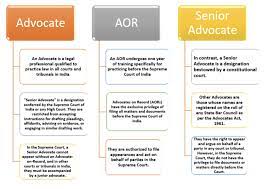
Advocate-on-Record System (AOR)

07.11.2023
Advocate-on-Record System (AOR) , Daily Current Affairs , RACE IAS : Best IAS Coaching in Lucknow
|
For Prelims: Advocate-on-Record ,work, For mains :Eligibility Criteria,Provisions governing the AOR system,Advocate-on-record in High Court |
Why in the news?
Recently, the Advocate-on-Record (AOR) was pulled up by the Supreme Court for filing a frivolous case and the PIL was dismissed.
Important points:
- The AOR is largely based on the British practice of barristers and solicitors where barristers wear black gowns and wigs to argue cases while solicitors take cases from clients.
- According to Section 30 of the Advocates Act, any advocate enrolled with the Bar Council is entitled to practice law before any court or tribunal in the country.
What is Advocate-on-Record:
- 'Advocate on Record' is a post in the Supreme Court.
- Only after obtaining this designation can an advocate appear before the Supreme Court or High Court.
- An AOR is an advocate in the Indian legal system who is registered and authorized by the Supreme Court of India to represent clients in that court.
- Their legal practice is mostly before the Supreme Court but they can also appear before other courts.
- Advocate on Record is a designation because the person must possess certain specific skills while pleading in the Supreme Court.
Their work:
- AORs have the exclusive right to file and argue cases in the Supreme Court on behalf of their clients.
- Only AoR can file cases before the Supreme Court.
- An AOR may involve other lawyers, including senior lawyers, to argue before the court, but the AOR is essentially the link between the litigant and the highest court of the country.
- AORs can appear in other courts also.
- Basically, AORs can file a petition, prepare an affidavit, file a Vakalatnama, or file any other application in the Supreme Court on behalf of the party.
Eligibility Criteria:
This is stipulated by the Supreme Court Rules, 2013, Section 5 relating to the eligibility of an advocate to be registered as an Advocate-on-Record, which is as follows.
- Must have at least 4 years of practice and at least 1 year of training with a Court approved AOR.
- Obtaining at least 60% marks in the examination prescribed by the Court with at least 50% in each subject.
- Having an office in Delhi within 16 km radius of SC and undertaking to appoint a registered clerk within 1 month of being registered as AoR.
- In 2014, the Supreme Court notified the 'Supreme Court Rules 2013' replacing the 1966 rules, which came into effect from 19 August 2015.
Provisions governing the AOR system:
Constitutional provisions:
- Under Article 145 of the Constitution, the Supreme Court is empowered to make rules for hearing cases and to regulate its procedure.
Legal Provisions:
- According to Section 30 of the Advocates Act, any advocate enrolled with the Bar Council is entitled to practice law before any court or tribunal in the country.
- This provision does not anywhere restrict a lawyer from practicing in the Supreme Court.
- The only restriction is that his name should be in the state list.
Section 52 of the Advocates Act, 1961:
- This section gives the Supreme Court the power to make rules for practice in the court under Article 145 of the Constitution.
- Article 145(1)(a) says that the Supreme Court may make rules to regulate how the Court operates and who may practice law there, unless it is inconsistent with any law made by Parliament. Do not go against.
- Constitutional validity of these rules:
- These rules were challenged in the Supreme Court of India in Balraj Singh Malik v.
- The court held that Section 30 should be read with Rule 52 of the Rules of the Supreme Court, which preserves the rule-making power of the Supreme Court under Article 145 of the Constitution.
- Therefore, the Supreme Court was given the power to decide the manner and rights of practice of different classes of advocates before it.
Advocate-on-record in High Court:
- This system has been fully implemented in the Supreme Court but this system is not followed in all the High Courts of the country.
- In some states, work is done under this system and in many places petitions have also been filed against not implementing this system.
- Section 34(1) empowers the High Court to make rules subject to which an advocate shall be permitted to practice in the High Court and courts subordinate to him.
There are different rules for Advocate-on-Record in the High Court of different states.